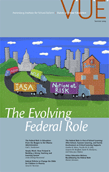The Harvard Family Research Project separated from the Harvard Graduate School of Education to become the Global Family Research Project as of January 1, 2017. It is no longer affiliated with Harvard University.
The Federal Role in Out-of-School Learning: After-School, Summer Learning, and Family Involvement as Critical Learning Supports (Voices in Urban Education, Summer 2009)
Summer 2009

Read the report cited in this article!
![]() This article is based on a paper commissioned by the Center for Education Policy as part of a series on "Rethinking the Federal Role in Elementary and Secondary Education."
This article is based on a paper commissioned by the Center for Education Policy as part of a series on "Rethinking the Federal Role in Elementary and Secondary Education."
Read the full report on our website.
To view other papers in the series, visit www.cep-dc.org.
The Summer 2009 edition of Voices in Urban Education (VUE), published by the Annenberg Institute for School Reform at Brown University, contains an article by Harvard Family Research Project (HFRP), "The Federal Role in Out-of-School Learning: After-School, Summer Learning, and Family Involvement as Critical Learning Supports." Published quarterly, VUE airs diverse viewpoints and shares new knowledge on vital issues in urban education.
Four decades of consistent research evidence demonstrate that out-of-school learning—family involvement in children’s education, after-school programs, and summer learning opportunities—all contribute to in-school success for children and youth. HFRP’s article makes a research-based case for federal provision of these out-of-school complementary learning supports from birth through high school, particularly for poor children, so that all students gain the skills that economists, educators, and employers agree are necessary for success in the 21st century.
The article provides a set of six policy recommendations, which include expanding current federal investments in family involvement, after-school, and summer learning programs, and launching new efforts to ensure that these out-of-school supports work with each other and with schools to promote shared learning and development goals.
Read the full article on the Voices in Urban Education website.
